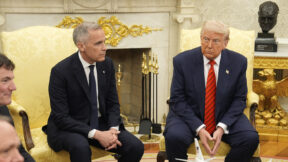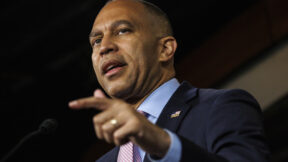‘They Were In For A Rude Awakening!’ President Biden and President Drescher Speak On SAG/AFTRA Strike Ending
President Joe Biden and Screen Actors Guild – American Federation of Television and Radio Artists (SAG-AFTRA) President Fran Drescher spoke out about the end of the actors’ strike with varying degrees of diplomacy.
The actors’ union went on strike in July, joining the Writers’ Guild of America in grinding Hollywood to a halt over issues like Artificial Intelligence and compensation in the streaming era. But on Wednesday night, the union reached a tentative agreement with the Alliance of Motion Picture and Television Producers (AMPTP) that ended the strike, weeks after the WGA strike was resolved.
President Biden celebrated the agreement in a statement emailed to Mediaite:
Collective bargaining works. I applaud SAG-AFTRA and Alliance of Motion Picture and Television Producers for working together in good faith towards an agreement that allows our entertainment industry to continue telling the stories of America. When both sides come to the table to negotiate in earnest they can make businesses stronger and allow workers to secure pay and benefits that help them raise families and retire with dignity. Over the last three years, workers have won historic victories that ensure record pay, record benefits, and an economy that grows from the middle out and bottom up. SAG-AFTRA members will have the final say on this contract, but the sacrifices they’ve made will ensure a better future for them, their families, and all workers who deserve a fair share of the value they helped create.
Drescher, who has been a tireless and outspoken negotiator for her union, was a guest on Thursday morning’s edition of CNN News Central, and weighed in on the deal at length — at one point suggesting the studios underestimated her at their peril:
BOLDUAN: Let me ask you about the road ahead, because, during these — this strike and negotiations, I heard you call the studios tone-deaf, greedy, out of touch, and calling kind of the way they were operating at one point as disgusting.
The alliance representing the studios says, after this: “The AMPTP is pleased to have reached a tentative agreement and looks forward to the industry resuming the work of telling great stories.”
What’s the relationship like going forward? What’s — with the studios, with actors? What do you — how does that feel? What do you say about that relationship now today?
DRESCHER: I think it’s going to be business as usual and zero problem.
You can never take these things personally. As Frederick Douglass said, power concedes nothing without demand. It never has, and it never will. And the demands were made and met. And I’m very grateful that what we felt, what we said, ignited a workers’ movement around the world. It rang like a clear bell tone.
And it landed in the ears of the AMPTP. They heard it, and they met the moment.
BOLDUAN: AI — I’m really interested in this aspect of the contract included in this deal, which really has never been mentioned before in an actors’ deal. Is the required consent aspect of this most important?
DRESCHER: Absolutely.
I mean, there was nothing in the contract that was consent. They didn’t have to ask for permission for anything. And now they have to ask for permission for everything. And the last piece was put in place very late in the evening the night before. We — you know, we passed without objection the motion to accept the contract and end the strike.
BOLDUAN: I have heard media watchers, media reporters, and analysts describe it this way, that the actors union, you all got a lot, and the studios, essentially, got very little, other than the ability to get back to work.
Do you see it that way?
DRESCHER: Well, they certainly got everything that we didn’t get.
(LAUGHTER)
DRESCHER: You know, the — it’s a negotiation. They’re going to win sometimes.
And, sometimes, they just have to accept where history is, and what needs to happen. And they may not have wanted to, because we’re the employees. So, what are we going to give?
It’s all about really understanding — besides our art and being the biggest foundational contributors to the whole industry, it’s up to them to concede certain things, so that we can feel honored and respected and protected and compensated.
And it’s never easy, but, over time, which is always my secret sauce, time and patience, we came to a meeting of the minds. And I think that they were expecting a different kind of leadership. And they were in for a rude awakening.
But once you wake up and smell the coffee, it’s hard to go back to sleep. And then we really just had to roll up our sleeves. And they knew that they were facing a different kind of leadership. And they had to lean in. And they did.
BOLDUAN: Well, the secret sauce of time and patience seems to have worked.
Watch above via CNN News Central.
New: The Mediaite One-Sheet Newsletter
Your daily summary and analysis of what the many, many media newsletters are saying and reporting. Subscribe now!






Comments
↓ Scroll down for comments ↓